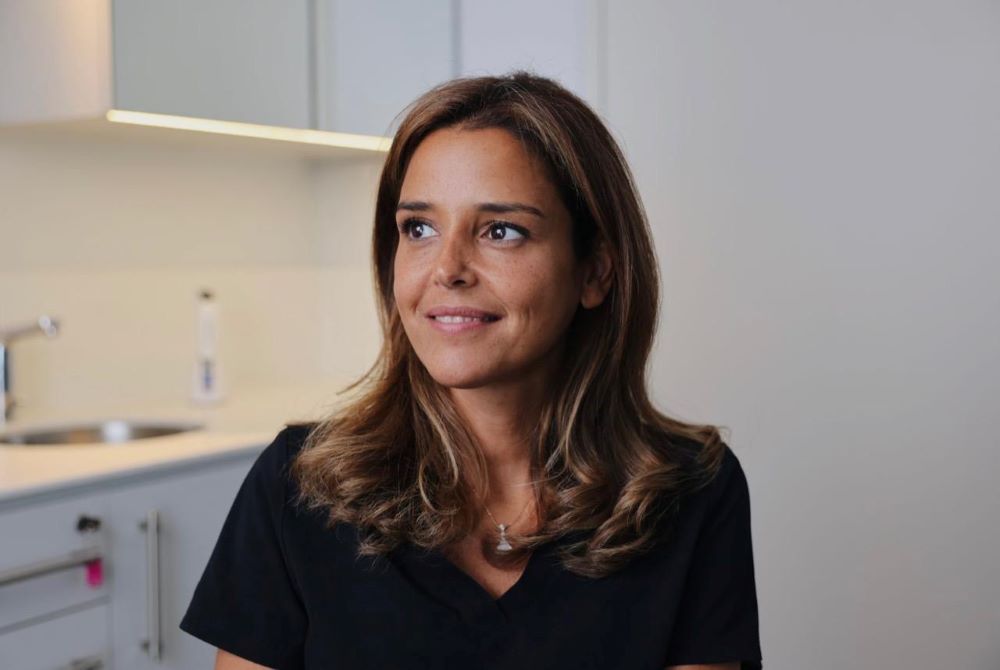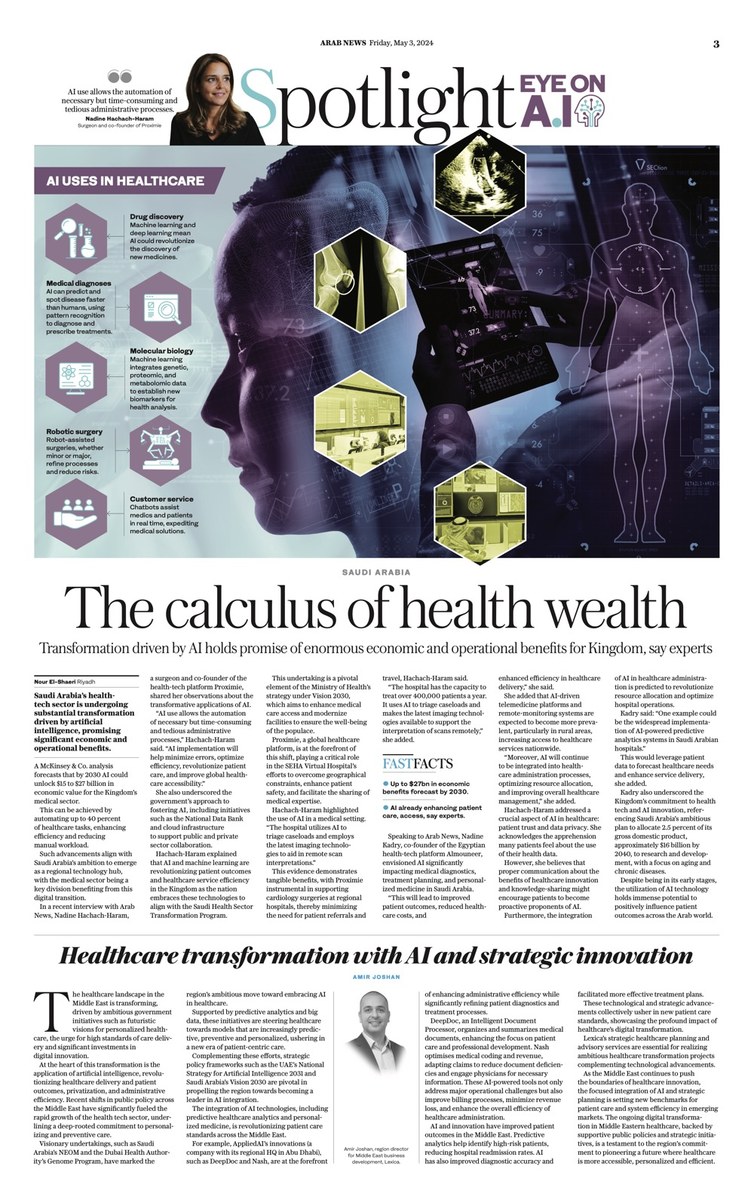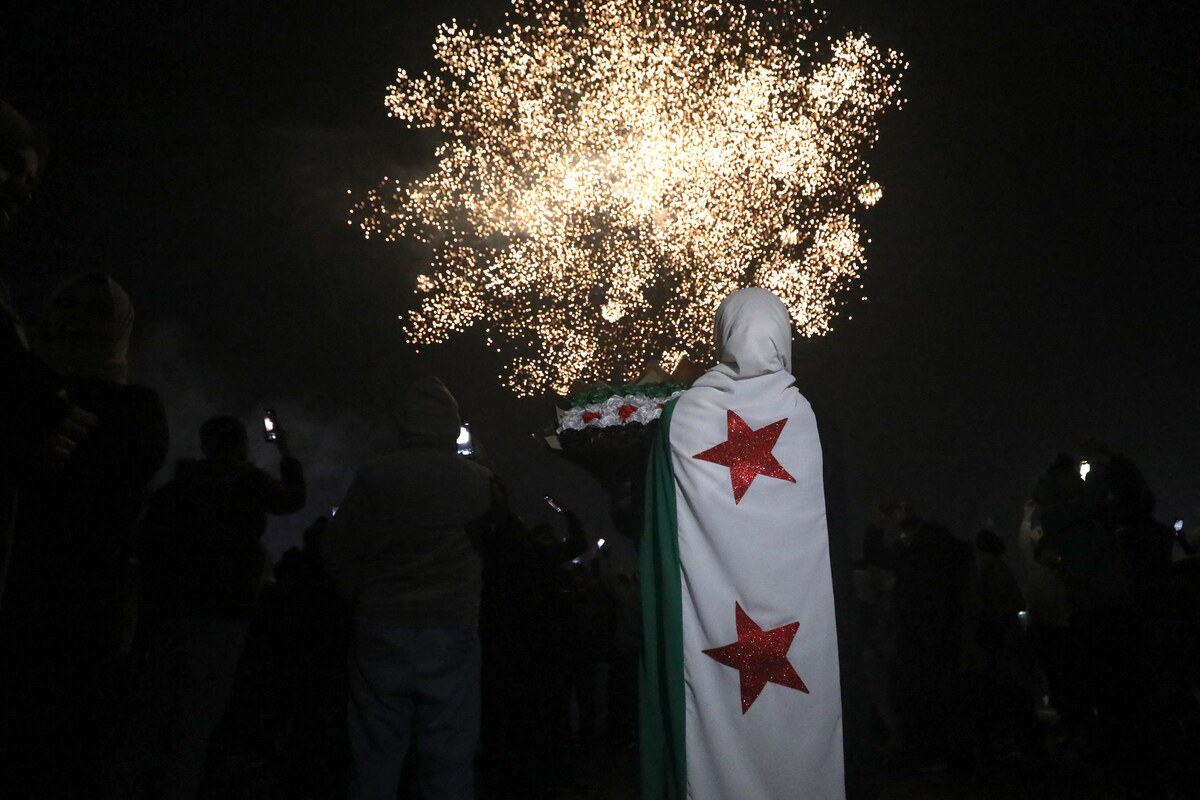RIYADH: Saudi Arabia’s health-tech sector is undergoing substantial transformation driven by artificial intelligence, promising significant economic and operational benefits.
A McKinsey & Co. analysis forecasts that by 2030 AI could unlock $15 to $27 billion in economic value for the Kingdom’s medical sector.
This can be achieved by automating up to 40 percent of healthcare tasks, enhancing efficiency and reducing manual workload.
Such advancements align with Saudi Arabia’s ambition to emerge as a regional technology hub, with the medical sector being a key division benefiting from this digital transition.
Crown Prince Mohammed bin Salman has highlighted the potential of this revolution, and is quoted as saying: “We are living in a time of scientific innovation, unprecedented technology, and unlimited growth prospects. These new technologies, such as artificial intelligence and the Internet of Things, if used optimally, can spare the world many disadvantages and can bring enormous benefits to the world.”
Time of transformation
In a recent interview with Arab News, Nadine Hachach-Haram, a surgeon and co-founder of the health-tech platform Proximie, shared her observations about the transformative applications of AI. She said this could be used for enhancing patient safety, communication, and service efficiency across Saudi Arabia’s healthcare sector.

Nadine Hachach-Haram is a surgeon and co-founder of the health-tech platform Proximie. (Supplied)
“AI use allows the automation of necessary but time-consuming and tedious administrative processes,” Hachach-Haram said. “AI implementation will help minimize errors, optimize efficiency, revolutionize patient care, and improve global healthcare accessibility.”
She also underscored the government’s approach to fostering AI, including initiatives such as the National Data Bank and cloud infrastructure to support public and private sector collaboration.
Hachach-Haram explained that AI and machine learning are revolutionizing patient outcomes and healthcare service efficiency in the Kingdom as the nation embraces these technologies to align with the Saudi Health Sector Transformation Program.
This undertaking is a pivotal element of the Ministry of Health’s strategy under Vision 2030, which aims to enhance medical care access and modernize facilities to ensure the well-being of the populace.
Proximie, a global healthcare platform, is at the forefront of this shift, playing a critical role in the SEHA Virtual Hospital’s efforts to overcome geographical constraints, enhance patient safety, and facilitate the sharing of medical expertise across Saudi Arabia.
Hachach-Haram highlighted the use of AI in a medical setting. “The hospital utilizes AI to triage caseloads and employs the latest imaging technologies to aid in remote scan interpretations.”
This evidence demonstrates tangible benefits, with Proximie instrumental in supporting cardiology surgeries at regional hospitals, thereby minimizing the need for patient referrals and travel, Hachach-Haram said.
Opinion
This section contains relevant reference points, placed in (Opinion field)
“The hospital has the capacity to treat over 400,000 patients a year. It uses AI to triage caseloads and makes the latest imaging technologies available to support the interpretation of scans remotely,” she added.
She shared a poignant illustration of this impact in the case of Noura Saleh, 70, from Tabuk, who required urgent surgery following stroke-induced heart failure.
The operation was successfully executed at a local hospital, with the SEHA Virtual Hospital’s cardiology team providing remote guidance through Proximie.
Hachach-Haram said: “It’s a great example of how distance is no longer an obstacle to receiving the best care promptly.”
Improved access and care
Speaking to Arab News, Rania Kadry, co-founder of the Egyptian health-tech platform Almouneer, shared her prediction of the Kingdom’s transformation over the next decade.

Rania Kadry is the co-founder of the Egyptian health-tech platform Almouneer. (Supplied)
Kadry envisions AI significantly impacting medical diagnostics, treatment planning, and personalized medicine in Saudi Arabia.
“This will lead to improved patient outcomes, reduced healthcare costs, and enhanced efficiency in healthcare delivery,” she said.
She added that AI-driven telemedicine platforms and remote-monitoring systems are expected to become more prevalent, particularly in rural areas, increasing access to healthcare services nationwide.
“Moreover, AI will continue to be integrated into healthcare administration processes, optimizing resource allocation, and improving overall healthcare management,” she added.
Hachach-Haram addressed a crucial aspect of AI in healthcare: patient trust and data privacy. She acknowledges the apprehension many patients feel about the use of their health data. However, she believes that proper communication about the benefits of healthcare innovation and knowledge-sharing might encourage patients to become proactive proponents of AI.
“Many patients are understandably nervous about the use of their sensitive health data, but if the benefits of healthcare innovation and knowledge-sharing are clearly explained, patients may embrace becoming ambassadors about the benefits of using and sharing data — helping the entire ecosystem,” she said.
Furthermore, the integration of AI in healthcare administration is predicted to revolutionize resource allocation and optimize hospital operations.
Kadry added: “One example could be the widespread implementation of AI-powered predictive analytics systems in Saudi Arabian hospitals.” This would leverage patient data to forecast healthcare needs and enhance service delivery, she added.
Kadry also underscored the Kingdom’s commitment to health tech and AI innovation, referencing Saudi Arabia’s ambitious plan to allocate 2.5 percent of its gross domestic product, approximately $16 billion by 2040, to research and development, with a focus on aging and chronic diseases.
“Can you imagine how much the country will progress under the young and progressive leadership?” She highlighted the launch of the Hevolution Foundation, a $20 billion Saudi Arabia initiative dedicated to advancing human health and extending life expectancy globally.
Despite being in its early stages, the utilization of AI technology holds immense potential to positively influence patient outcomes across the Arab world.





































